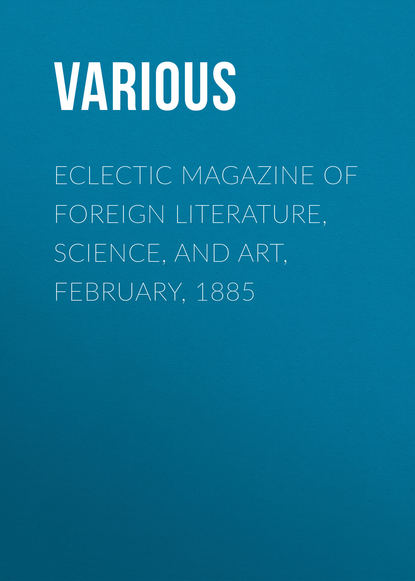 Полная версия
Полная версияEclectic Magazine of Foreign Literature, Science, and Art, February, 1885
29
“How Servants and Lords shall keep their degrees.” See Lewis, pp. 224, 225.
30
Godwin’s Catalogue of the Bishops of England, 1615.
31
Cromp became some time after this a zealous preacher of the doctrines maintained by Wycliffe.
32
See Milman. See also the Petition itself in Select English Works of John Wycliffe, vol. iii. edited by Thomas Arnold.
33
Godwin’s Catalogue of the Bishops of England.
34
Fuller’s Church History, Book IV. cent. xiv.
35
Wycliffe’s Latin Works, edited for the Wycliffe Society by Dr. Buddensieg, vol. ii. pp. 555, 556.
36
Introduction to Fasc. Zizan., p. 44.
37
In so far as the printing of this work is concerned, the reproach of England was wiped off by the Clarendon Press in 1869; but it was a German, Dr. Lechler, who edited this great work, the “Trialogus.”
38
Shirley, Introduction to Fasc. Zizan., p. 47.
39
Shirley’s Catalogue of the Original Works of John Wycliffe. Preface, p. 6, Oxford: 1865.
40
Milman’s Latin Christianity, Book XIII. chap. vi.
41
Illustrium Majoris Britanniæ Scriptorum Summarium in Quasdam Centurias Divisum.
42
Select English Works of John Wycliffe. Introduction, vol. iii.
43
This is the first of “the most rare and refined works” that collectively make ‘The Phœnix Nest,’ published in 1593. Reprinted in vol. ii. of ‘Heliconia,’ edited by T. Park, 1815. The preface bears a marked resemblance to the famous epilogue to 2 Henry IV.
44
Shirley: Preface to a Catalogue of the Original Works of John Wycliffe. The “Trialogus” must have been written, some have it, between 1382 and 1384. This is shown by Vaughan and Lechler.
45
Knighton, quoted by Dr. Buddensieg.
46
The Holy Bible, containing the Old and New Testaments, with the Apocryphal Books, in the earliest English versions, made from the Latin Vulgate, by John Wycliffe and his followers. Edited by the Rev. Josiah Forshall and Sir Frederick Madden. In four volumes. Oxford – at the University Press: 1850.
47
Bar. iii. 20. The last words are “in place of them. The young …” rendered in the Geneva version – “Other men are come up in their steads. When they were young they saw the light.”
48
Forshall and Madden’s edition of Wycliffe’s Bible. Preface, pp. 17, 18.
49
Godwin’s Catalogue of the Bishops of England.
50
Fuller, Book IV. cent. xv.
51
Wycliffe and Hus. From the German of Dr. Johann Loserth, Professor of History at the University of Czernowitz. 1884.
52
Luther’s Preface to the Letters of Hus.
53
See Epilogue to Henry IV. Part II.
54
Hallam’s Constitutional History of England, chap. ii. 57, 58, 6th ed.
55
Knox’s History of the Reformation in Scotland, being volume first of his Works, collected and edited by David Laing. Edinburgh, 1846.
56
Shirley’s Introduction to Fasc. Zizan., pp. 45, 46.
57
Speed’s Chronicle, p. 672 – ed. 1632.
58
Preface to A Catalogue of the Original Works of John Wycliffe: 1865.
59
M’Crie’s Life of John Knox, Period I.
60
Milton, Paradise Lost, Book VI.
61
A True Account of the Rye House Plot, by Thomas Sprat, Bishop of Rochester, 1685.
62
State papers, Charles II., June 1683 – “A Particular Account of the Situation of the Rye House.”
63
Rye House Papers. Examination of Robert West of the Middle Temple. A special collection among the State Papers. It may be remembered that when this collection was examined an original treatise of Milton was discovered among the documents – a find which led to Macaulay’s essay on Milton.
64
Rye House Papers. Examination of Josiah Keeling and Robert West.
65
Ibid.
66
Rye House Papers. Examination of Josiah Keeling and Robert West.
67
Ibid.
68
Rye House Papers. Examination of Josiah Keeling and Robert West.
69
Ibid. Examination of Thomas Shepherd.
70
Rye House Papers. Examination of Robert West and Josiah Keeling.
71
Rye House Papers. Examination of Robert West and Zachary Bourn.
72
Rye House Papers. Examination of Lord Howard, Alexander Gordon, and Robert West.
73
Rye House Papers. Examination of Col. Romsey and Robert West.
74
He was in fact a “recluse” in the ancient and proper sense of the term. For in the Bishop’s time it still remained customary, after an imposing ceremony, literally to seal and shut up by the hands of a bishop those – men or women – who elected to be recluses, in a small chamber built for the purpose close to the wall of some church with an opening inwards that the immured tenant might hear the service and receive necessary subsistence. We are told, for example, by St. Foix that Agnes de Rochier, the beautiful daughter of a rich tradesman, commenced such a life at the church of St. Opportune, in Paris, on the 5th of October, 1403, and though then of only eighteen years, lived in this hermetic state till the ripe enough age of eighty.
75
It was observed by Scott of Amwell, a critic of the verbal school, but not without his soundness, and junior to Collins by nine years, that the Oriental Eclogues, which appeared in 1742, were “always possessed of considerable reputation,” till Johnson “having hinted that Collins, once in conversation with a friend, happened to term them his Irish Eclogues, those who form opinions not from their own reason or their own feelings, but from the hints of others,” caught the hint and circulated it. “That Collins,” he adds, “ever supposed his eclogues destitute of merit there is no reason to believe; but it is very probable, when his judgment was improved by experience, he might discover and be hurt by their faults, among which may possibly be found some few instances of inconsistence or absurdity.”

